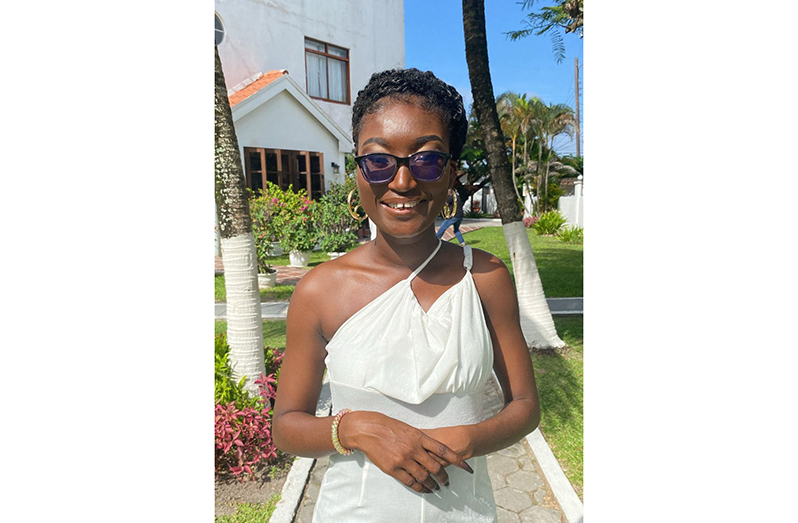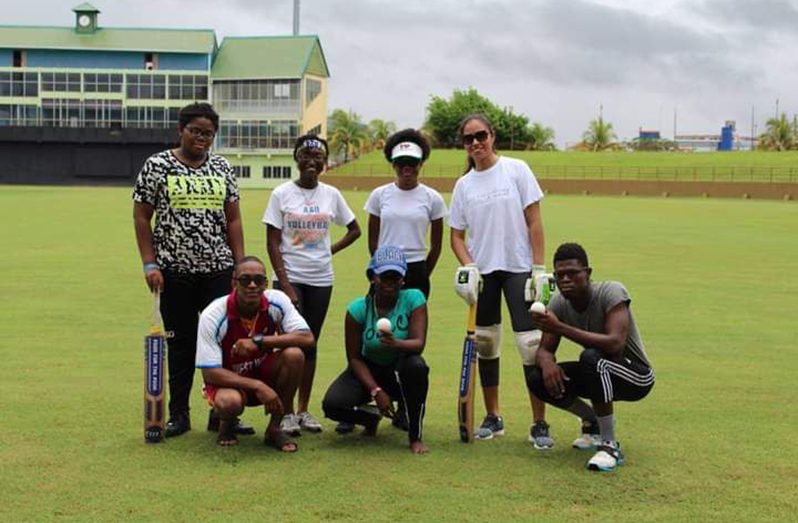How the blind or visually impaired play the great game of cricket
AS Guyanese people at heart and Caribbean people in the soul, cricket is more than a game; it is a part of who we are. The hard white ball, diving to ensure a catch, and the thunderous screams accompanying a wicket or a six.
The sport of cricket is a part of us, all of us. There is, however, a team that plays the game a bit differently.
Unlike the Kings, Tallawahs, or the Knight Riders, the West Indian Blind Cricket team plays cricket almost entirely by sound. The teams are made of extraordinary men and women with differing levels of visual impairment and blindness. Ackila Smith is a long-time member of the women’s team, and as she and her team prepare to play in India next year, she says that playing cricket is so much more than throwing around a ball for her. It creates a sense of belonging, being surrounded by others like herself, a feeling of accomplishment with each game won, and a unique sense of identity.
Ackila is perhaps one of the most warm, welcoming and jovial persons you will ever meet. She is positively joyful and is great at making friends and fitting in. The 26-year-old hails from Lamaha Springs and is visually impaired. As a professional teacher and disability advocate, Ackila has always been passionate about issues affecting people living with disabilities.
Ackila proudly calls herself a blind cricketer, and with good reason. She has worked and practised to make a name for herself in the sport. Playing blind cricket, or any sport as someone with a disability, is admirable. But Ackila’s strength and perseverance were forged throughout her years of dealing with struggles as they came. She met her challenges like the ball hits the bat.

Ackila lost most of her eyesight at the age of ten. This was a gradual but difficult decline for a young Ackila, who was still grappling with the loss of her mother, who passed away a short while before. “When I was in school, the teachers realised that I had to sit in front of the class, and it was concerning because I had to see the board.
At that time, my mom had died, so I was living with my grandparents, and my grandmother took me to the hospital,” she said. This check-up would reveal the true extent of Ackila’s sight. She shared that the nerves in her eyes are weak and drastically limit her range of sight to just a short distance in front of her.
Ackila was also diagnosed with Poland syndrome, a physical disability that she has had since birth. Her disabilities made her childhood a particularly difficult one. As time went on, however, she slowly learned and adapted to her surroundings. She learned to navigate the world in her own way.
Although she can’t precisely describe it, Ackila makes her way around with whatever she can see in her line of vision, primarily by looking down to remember certain steps and paths. She stated that, “Many people who are blind or visually impaired learn to adapt because you have a choice. We know we want to be independent; we do not want to depend on anybody.”
GETTING INTO THE GAME
Before 2018, Ackila had no clue that the sport of blind cricket existed. She did, however, get the chance to try out for the team and was accepted with stellar reviews. “I went to the Society for the Blind, and that was where I was introduced to blind cricket. They had an event where we had auditions, and I wanted to join.”
She remembers the first time she heard about blind cricket and how fascinating it was that people just like her were athletes. “I wanted to know how the game was played, to know how blind people played cricket.” Ackila joined the team just a few weeks later, and she says it was the best choice she has ever made.
Ackila and her teammates do play by slightly different rules. The biggest difference lies in the team’s ball, which is equipped with bells inside to make a noticeable sound so that those who cannot see it can hear it. On the throw of the ball from the bowler, he or she would shout “play” to alert the team that the ball is now in motion. The game strongly relies on communication, teamwork, and skill. “I was so happy, I am still happy now, that I got a chance to be in this place. As a person who is visually impaired, to see a completely blind person play, I was more amazed.”
Ackila is undeniably happy that she gets to represent her country in the way she does. The sport has done a lot for her. She explained that her team has created a sense of familiarity and belonging. “I was happy to know that I can do this. I felt a sense of belonging because I was around people like me.
There was no judgment. I was allowed to make mistakes and have hiccups,” she said. As her career and the team advance and take bigger steps, Ackila will continue to challenge social norms. She stated that, “The game is like our identity. We are a vulnerable community, so to have something we can do in terms of sports, it is like a whole accomplishment on our end. And to actually be a part of the West Indies women’s team, I feel very special and unique. That I get a chance to belong and get a chance to do things quote-unquote normal people would do.”



.jpg)








